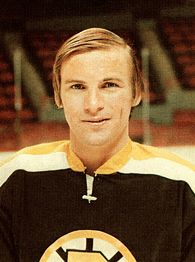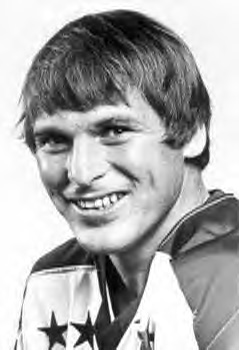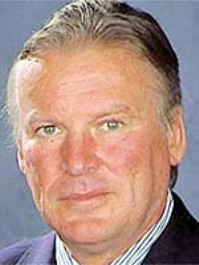Project 2,996: Remembering Garnet Edward “Ace” Bailey
Posted by Pasadena Phil in Uncategorized on September 10, 2009

Today we honor for the eight time, the memories of the many innocent lives taken from us on September 11, 2001. Each represents a personal tragedy to their families and friends. To the majority of us who didn’t know anyone who died that day, it is important that we take the time to remember that “there but for the grace of God go I”. It could have been me that fateful day. Or you. But it wasn’t. Let’s be grateful. But more on that later.
Below is my personal story about a boyhood hero who died in that horrible disaster: Garnett “Ace” Bailey. He was part of the fabled Boston Bruins hockey team of the late sixties and seventies that I was obsessed with in my high school years.
Much has been written about Ace by people who knew him well so there is no point in my rehashing his career. If you are interested in his biography, Encyclopedia.com is well worth reading. Better yet, ESPN’s Scott Burnside wrote an essay titled: “Bailey’s Big Smile, Heart Drive Ace’s Place” that captures what Ace Bailey was about. An inspiring testimony about his very generous character and the unique legacy of the Ace Bailey Children’s Foundation that he left behind for the ages. There is absolutely nothing I could say that would shed any further light on the “real” Ace Bailey. I didn’t know him personally . But I do have a personal story to tell about Ace that I am sure Bruins fans from those days would appreciate. Maybe non-fans might enjoy it too. It’s not really about hockey.
Ace first entered my life when I was a sophomore in high school. Like all of my friends, I was a rabid Boston Bruins hockey fan. I mean rabid. It’s all we talked about. We played floor hockey with our feet and flattened Coke cans in the hallways between classes. We played desk hockey with nickels during class (yeah, yeah spare me, I don’t want to hear it. We can’t all be like you.). It’s all we talked about during hockey season. If you weren’t a fan, we were insufferable. But we had good reason.
Those were heady days for the Bruins. Magical is no exaggeration. Bobby Orr and Phil Esposito owned the town. They brought the Stanley Cup back to Boston with about as exciting a brand of hockey as there ever was. It wasn’t just that they were winning championships but that they were also doing it with such style.
They were an incredibly fun team. There were so many eccentric and bigger-than-life personalities and we just couldn’t get enough of them. And no one wore helmets back then so you knew what they looked like. Not like today’s body-armored players and goalies hiding behind sofa-sized goalie pads. It was more personal. And the Bruins were an extraordinary offensive machine, even when killing penalties. They not only had the fearsome high-scoring line of Phil Esposito, Wayne Cashman and Ron Murphy (later Ken Hodge), but all four (yes, four) lines were serious offensive threats. There was never a dull moment on the ice.
So how could a man who only scored 107 goals over a ten-year career have not only cracked the roster on such a team but do it in a way that made him so popular among fans and players alike? That is, after all, Ace’s real story. He was loved. Well, he brought a lot to the game. He was almost electrifying when he jumped onto the ice. He was a very fast skater who played with great intensity and flair on both offense and defense. He would do whatever that needed to be done to be effective. It wasn’t about statistics with Ace unless it needed to be. The team just played better when he was on the ice. And he scored big goals when he had to.
Bailey’s most famous play occurred in Game 1 of the 1972 Stanley Cup finals against the New York Rangers. Late in the game, with both sides in balance, Bailey skated down the left side of the rink around Ranger Brad Park, who had the puck. Bailey, who had only scored nine times in that entire year, kicked Park’s stick, and flipped the puck over Rangers goaltender Ed Giacomin and into the net. Bailey’s teammate at the time, Phil Esposito , told a reporter for the Tampa Tribune, “I mean, Ace roofed it. We were so… happy for Ace. We loved that guy.”
We loved him too. After winning one of their two Stanley Cups (I can’t remember which one), several of the Bruins, I believe it was Ace, Wayne Cashman, Johnny McKenzie and maybe (probably) Derek Sanderson were later picked up by the local constabulary (“Now now, we’ll have none of that! Come along before you break your mothers’ hearts. Quietly now. That’s a good lad.”) for celebrating too hard in public. It must have been some celebrating to get picked up that night. The entire town was celebrating wildly and Boston was “Drink Town USA” on any normal night. But on championship night? Arrested? What exactly were you guys doing?!
Before “sleeping it off” in jail, they were allowed one phone call and reportedly, Ace used it to send out for Chinese. That may sound lame today when fans celebrate championships by flipping cars and rioting but back then, this would normally have been a minor scandal, at least with parents. But given the euphoria of the moment and the personality of this team, not only was it not a scandal, it added greatly to the team’s aura of boyish exuberance. They were cool! And Ace was the coolest of the cool.

I have lots and lots of fantastic memories of those teams. How can I not? Bobby Orr? Phil Esposito? Gerry Cheevers? Derek Sanderson? We could only fantasize in our wildest dreams of ever being as good as Orr or Esposito. But Ace? He was different. He was special in a different way. He was like us in a way we imagined we could be. He hustled and played with infectious enthusiasm. With Ace, it seemed possible. He was who we probably would have been had we been good enough to make the league. We understood “being Ace Bailey”. Who can understand being Bobby Orr? Or Tiger Woods? It’s just beyond the grasp of us mere mortals to imagine being that good at anything.
Ace was traded to Detroit in 1973 and I eventually lost all interest in not only the Bruins, but in pro hockey itself once the Bruins traded away Phil Esposito and Bobby Orr. The magic was gone and the void was too big. I came to realize that I wasn’t so much a hockey fan as I was a fan of that team. Maybe it was because I was young but there hasn’t been anything like them since to capture my imagination and kindle my enthusiasm. Hockey had disappeared from my life. Ace’s death on 9/11/01 brought it all back.
I was to destined to meet Ace when I was working as an accountant for Nabisco Confections in Cambridge Massachusetts in 1981-2 when I had already lost interest in hockey. He would drop by every three months to pick up his check on a celebrity endorsement contract. He wasn’t so famous as to attract much attention when he dropped by but a few of us were big fans and looked forward to his visits. He wasn’t the most famous celebrity on contract by far. I wish I could tell you about some great moments but there weren’t any. I don’t even remember what we talked about. He was only around for 10-15 minutes. But he was exactly the Ace we saw and read about. He was a high energy and very enthusiastic guy, great to be around. I have gone on to meet many celebrities much more famous than Ace but I have usually been disappointed. Ace was the real deal. Those days were probably the last time I gave hockey any thought.
I had so lost interest in hockey that despite now living in Pasadena, I had not realized that he was a scout for the LA Kings. When, like everyone else I guess, I scoured the lists of 9/11 victims, the only person I found that I had any personal connection to was Ace. Even though I didn’t know him, it made the tragedy more personal and real. As if it wasn’t real enough.
Describing the enormity of the tragedy that occurred on September 11, 2001 is not as easy as one would think. Yes it was spectacular and many innocent Americans died but what did it mean? It wasn’t immediately obvious. America knew something horrible had happened but we didn’t know what to make of it.
It was nothing like the Pearl Harbor attack, for instance, where a known enemy had attacked an important U.S. military target. Everyone who lived through it grasped the enormity of that tragedy upon first hearing the news. It mattered little whether or not they had personally lost a loved one. It wasn’t about the number of people killed or that one was an important person. We were at war, everyone knew it and all out war affects everyone. Something fewer and fewer of us appreciate in the new world of “police actions” and “limited strategic military operations”. War used to involve everyone.
It was also nothing like the JFK assassination where only one man, albeit the President of the United States, was murdered on television by a deluded one-man communist revolution. The most powerful man on Earth had just been murdered before our eyes. We looked at the JFK portrait on the wall behind the teacher’s desk next to the American flag every day while pledging allegiance to the flag. Suddenly he was dead and his death was on television. It was disturbing on a very personal level even for children. That kind of thing just wasn’t supposed to happen here. It couldn’t. But it did and our innocence died that day. The enormity of that tragedy settled upon us instantly. We knew what it meant. The days of Camelot were over. Life would never be the same. I still remember it like it was yesterday.
But 9/11 was different. I was still in bed when the news came on the radio that a commuter plane had crashed into the World Trade Center. It was quickly upgraded to a major commercial jet. “What!?!” I jumped out of bed knowing this was going to be on television. The WTC was engulfed in flames. Within minutes, another jet hit the neighboring WTC tower as I was watching. It took a few minutes for it to hit me that I know people in those buildings! They may only have been voices on the telephone but they were people who had names and personalities and all of the other things that make them human. I left for the office wondering how this was going to end. How exactly do they put out this kind of a fire? It never occurred to me how it would end.
Upon arriving at the office, I passed one of my associates who, like most everyone else, was going home. “Is the office closed?” I asked. “The tower collapsed.” he told me. “How can that be?” I thought. I returned home in time to witness the other tower collapse. Like everyone else, I was wondering how many people died and whether I knew any of them. Estimates of up to 55,000 were being mentioned. Considering there were maybe 10,000 or more Citi employees in the towers, the odds that I knew a victim were pretty good. Luckily, only one or two Citi employees died and I knew neither one. A tragedy for sure but it is important to keep in mind that it was a miracle that so few people died. and of the 2.996 fatalities, nearly a third lost their lives rushing into the buildings to save others.
Nevertheless, the tragedy part was too much to grasp. What did it mean? War? Against who? It was pure evil inflicted by a barbaric Stone Age people at war with modernity. Our very freedoms and openness as a society left us vulnerable to the unthinkable. It was an act of war like none other in history but who was the enemy? Unlike Pearl Harbor, these enemies did not strike a military target. They struck innocent civilians at their most vulnerable. None of the victims were so famous as to help define the event.
The number of people who died is also irrelevant. They were just at the right place at the wrong time. Had the only victim been the poor flight attendant whose throat was cut, it might have offered a more compelling story on an individual level. As Joseph Stalin once famously said “One death is a tragedy. A million deaths is a statistic.”
Unfortunately, 2,996 has become an obscure statistic diminishing the personal tragedy each death represents. Because for most, it is a day to remember terrorists flying planes, a day of spectacular images of collapsing buildings shown on the news together with hellish pictures of large billowing black clouds of debris overtaking panicked crowds. And then there is the dollar cost in property damage and economic impact. Yet many of us have yet to grasp the true tragedy of this event, the loss of personal liberty we were forced to surrender. Somehow, probably because our reaction has been one of general fear, 9/11 is now at risk of being co-opted as a day to ponder the “green” agenda.
The loss of life and economic damage was bad enough. But we really should have taken away a better lesson from all of this than an easy surrender of our liberties in exchange for a very elusive sense of safety. But that is a story for another day. Today, let’s honor the 2,996 innocent victims who could have easily included you or me. Let’s be thankful that we were spared and pray for the families and friends of those who weren’t so lucky. Like the family and many friends of Ace Bailey.

We haven’t forgotten.
Rest in peace.
by Phil Boucher
You must be logged in to post a comment.